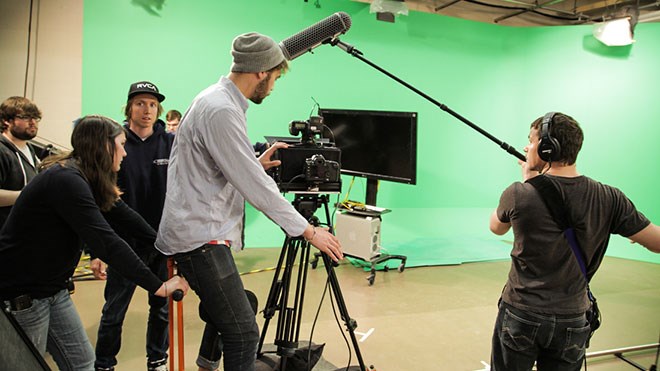The future of film and television production in North Bay is about to get brighter with a new investment by Canadore College in its film programming and facilities.
In June, the school announced it would start offering a one-year post-production graduate certificate program in addition to the broadcast television and digital cinematography programs it currently offers.
Yura Monestime, a professor in Canadore’s School of Media and Dramatic Arts, said the new program provides students with an extra level of training that will make them even more versatile when it comes to their skills in the film and TV industry.
“What it does is it teaches students advanced skills, not only in editing, but in finishing a product,” he said. “It takes weeks, if not months, to go through that post-production process.”
After filming, a production has to go through several stages before it’s ready for release, Monestime noted, including editing, colour correction, sound design and graphics.
Although students in the television and cinema programs get some training in post-production, the new program “takes it a step above it and really prepares the graduate to enter into a junior position in a post-production facility.”
To support the new training, Canadore also plans to construct a brand-new post-production facility, whose state-of-the-art technology will allow for work in editing, audio mix, automatic dialogue replacement, music, and more.
A 50-foot by 40-foot theatre, designed to hold about 15 people, will come equipped with Dolby Atmos surround sound, a new type of surround sound filmmakers are starting to use in their projects. Canadore will be the only education facility in Canada and one of only a handful of facilities across the country that allows projects to be produced with Atmos.
All that specialized equipment brings film editing to a professional level that will give graduates a hand up when entering the industry.
“You can have an edit suite in your kitchen if you want — it’s a laptop and a couple of speakers and a monitor and you’re good to go,” Monestime said. “But that won’t get you through the front door of a theatre or a broadcaster.”
Currently, film crews shooting in Northern Ontario are in the North only for a few weeks before they leave. They’re forced to go elsewhere to complete the post-production process simply because there’s no facility anywhere in Northern Ontario that can accommodate their needs.
This facility will change that, allowing any company from Canada, the U.S. or Europe to stay in the North for the end-to-end post-production process, Monestime said, allowing them to take full advantage of the film grants provided by the Northern Ontario Heritage Fund Corp. (NOHFC). They stipulate that a film production has to be completely finished in the North to be accessed.
Productions that come to the North span the $1 million to $5 million range, and those projects result in work for locals, fueling the demand for Canadore’s film programming.
Since launching the three-year cinema program four years ago, enrollment is closed almost every year at 34 students, and the two-year TV program is going equally strong. Students also have the option of crossing over from one program to the other, earning them two diplomas in four years, instead of the traditional five.
“I think, out of 27 students that graduated, 24 found employment and are still employed in the film industry within the last year, and most of that in the North,” Monestime said.
“The ability to go from profession to profession makes them very versatile.”
The province has approved the post-production program, which is scheduled to accept its first cohort in the fall of 2017.
Construction of the facility itself may begin this fall, if a few loose ends can be tied up in time. Monestime said a location has been chosen and a design is currently being drawn up.
Once complete, although it will be located in North Bay, Canadore hopes it will become a pan-Northern facility accessible to anyone working on film or TV projects in the North.
“We don’t want this to be North Bay-centric; we want it to be open to the whole North,” Monestime said. “We want to really make this an open facility, so anybody that has a movie or a project — it goes from documentaries, television shows and actual movies for theatre — can run through this place.”




